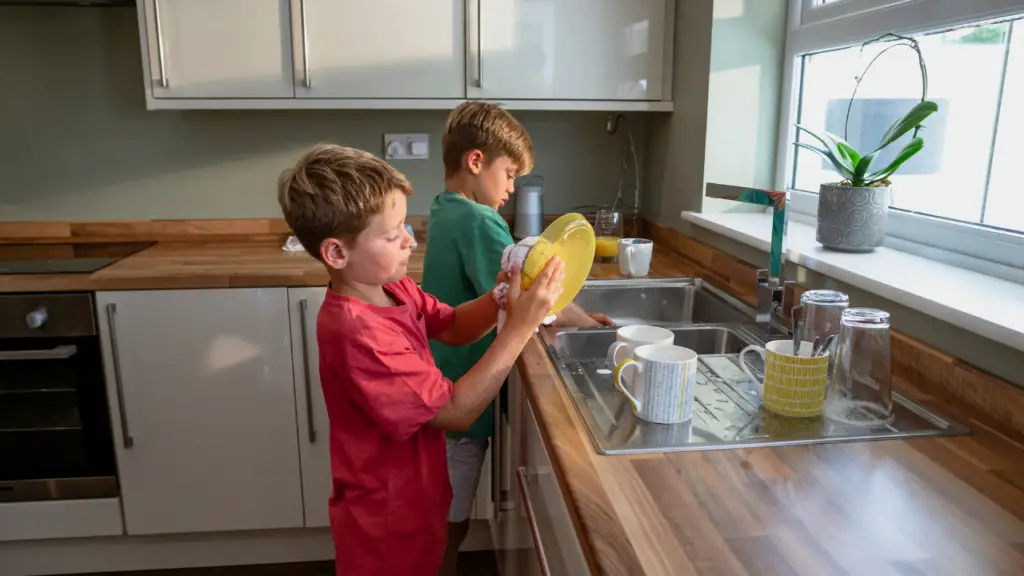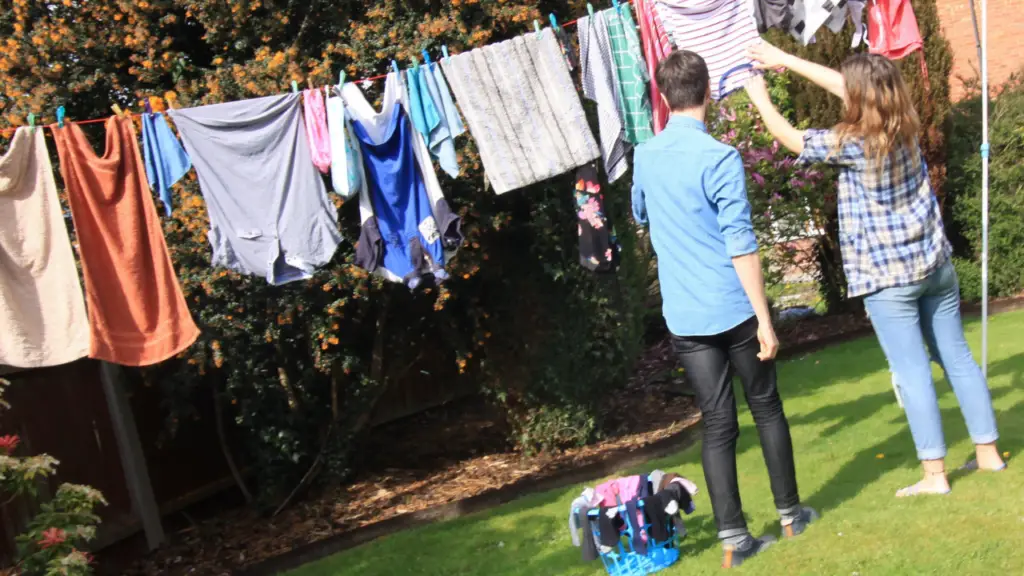
How to Encourage Siblings to Share Responsibilities at Home?
Imagine waking up on a bright Saturday morning.
Toys are everywhere, breakfast dishes pile up, and the living room bears the aftermath of a sibling pillow fight. In the midst of the chaos, wouldn’t it be wonderful if the siblings joined forces to restore order?
Teaching siblings to share home responsibilities isn’t just about a cleaner space. It’s about fostering teamwork, imparting life skills, and nurturing a bond that lasts forever. Dive in to discover ways to inspire this collaborative spirit!
Some of the links in this post are affiliate links. This means if you click on the link and purchase the item, I will receive an affiliate commision at no extra cost to you. All opinions remain my own. Read more on our Privacy Policy Page
Benefits. The Why: More Than Just a Tidy Space
We often equate chores with the sole objective of maintaining a clean and organized environment. But when siblings share responsibilities at home, the benefits extend far beyond just a neat living space. Diving deeper into the “why” reveals layers of advantages that contribute to personal growth, social skills, and even future preparedness. Here’s a comprehensive look at why sharing responsibilities at home is so much more than keeping the clutter at bay.

Building Teamwork and Cooperation
Every chore, whether it’s cleaning up after dinner or doing the laundry, offers an opportunity for collaboration. When siblings learn to work together, they are essentially practicing teamwork in its most organic form. They understand the importance of delegation, compromise, and shared effort. They realize that two hands are better than one, and achieving a common goal is easier when everyone contributes.
Nurturing Emotional Intelligence
By sharing chores, siblings become more attuned to each other’s feelings and preferences. They might notice that their sister dislikes washing dishes but loves gardening. Or perhaps, they’ll realize their younger brother struggles with folding clothes but is a pro at setting the table. Recognizing these strengths and weaknesses allows siblings to demonstrate empathy, patience, and understanding, fostering emotional intelligence in the process.
Instilling Responsibility and Accountability
With shared responsibilities comes the lesson of accountability. When a task isn’t done or is performed poorly, it affects the entire household. Through these shared chores, siblings learn the importance of doing their part and owning up to their responsibilities. They understand that their actions, or lack thereof, have consequences that impact others.
Developing Problem-solving Skills
Not every chore goes as planned. The vacuum cleaner might malfunction, or they might run out of cleaning supplies halfway through tidying up. Such scenarios force siblings to think on their feet, innovate, and come up with solutions. Over time, this nurtures their problem-solving skills, preparing them for bigger challenges in the future.
Creating a Sense of Ownership and Pride
When siblings work together to maintain their shared living space, it instills a sense of ownership. This isn’t just their parents’ home; it’s their space too. And when they put in the effort to keep it clean and organized, it results in a palpable sense of pride. They can look at their tidied room or the meal they cooked together and think, “We did that!”
Strengthening Bonds and Building Memories
Beyond the tangible benefits, shared responsibilities create a treasure trove of memories. The playful squabbles, the teamwork, and even the occasional blunders contribute to stories they’ll reminisce about in the future. This shared journey not only strengthens their bond but also gives them tales of teamwork, challenges, and triumphs to share.
While a clean and organized space is undoubtedly a plus, the act of siblings sharing responsibilities at home serves a larger purpose. It’s about shaping character, teaching invaluable life skills, and weaving a tapestry of shared experiences. So, the next time chores become a point of contention, it’s worth remembering the profound, lasting impact they can have on siblings’ growth and relationships.ing moments.
Understand the Challenges
Introducing a collaborative chore system among siblings might sound straightforward on paper, but in practice, it’s often met with a variety of challenges. Children, being distinct individuals with their own temperaments, likes, and dislikes, can make the process complex. To craft an effective strategy for shared responsibilities, it’s crucial first to recognize and understand these challenges. By delving deep, we can design solutions that are not just effective but also sustainable.

Age Gaps and Varied Abilities
In families with significant age differences between siblings, task distribution becomes a nuanced affair. What an older teen can handle with ease might be an insurmountable task for a toddler. The challenge lies in ensuring that everyone contributes according to their capability without feeling overwhelmed or underutilized.
Diverse Interests and Preferences
Each child is unique. One might revel in the art of cooking, finding joy in creating dishes, while another might view it as a tedious chore. Some might find solace in organizing their surroundings, whereas others might feel stifled by it. Balancing these diverse preferences to ensure that chores don’t become a source of resentment is crucial.
Unequal Perception of Fairness
It’s human nature to compare, and siblings are no exception. A common challenge is the perception (or misperception) of fairness. If one child feels they’re doing the bulk of the work or getting the short end of the stick consistently, it can lead to feelings of injustice and discord.
Lack of Motivation
Let’s face it: chores, by definition, aren’t the most exhilarating tasks. Many kids would rather play video games, read, or hang out with friends than clean their room or wash dishes. Instilling a sense of motivation, and more importantly, maintaining it, can be a significant hurdle.
Distractions and Procrastination
In our digital age, distractions are aplenty. With gadgets, games, and a world of content just a click away, staying focused on a household task can be challenging. The allure of immediate gratification from these devices can often lead to procrastination, pushing chores to the back burner.
Fear of Imperfection
For some children, especially perfectionists, the fear of not doing a task “just right” can be paralyzing. They might shy away from chores out of fear of criticism or the desire to avoid failure. This challenge requires a delicate balance of encouragement and understanding.
Understanding these challenges is the first step toward creating a harmonious system of shared responsibilities. By acknowledging and addressing each challenge head-on, parents can pave the way for a smoother integration of chores into their children’s lives. The goal isn’t just to get the work done but to do so in a way that fosters growth, understanding, and collaboration among siblings.
Practical Steps to Encourage Siblings to Share Responsibilities at Home
Inspiring siblings to partake in shared responsibilities at home requires a mix of creativity, consistency, and understanding. While the idea of collaborative chores is valuable, translating that idea into everyday practice is where the rubber meets the road. Let’s delve into actionable and practical steps parents and guardians can employ to ensure that shared chores become an integral and harmonious part of household dynamics.

1. Create a Chore Chart
A visual representation of tasks, such as a chore chart, can be immensely effective. Design a weekly or monthly chart detailing who is responsible for what chore on which day. This not only provides clarity but also instills a sense of ownership and accountability. Personalize these charts with colors, stickers, or drawings to make them more engaging.
2. Incorporate a Reward System
Positive reinforcement can work wonders. Introduce a reward system where siblings earn points or tokens for every chore completed. These can then be redeemed for small rewards, like an extra hour of TV time, choosing the dinner menu, or a special treat.
3. Host a Weekly Family Meeting
Set aside time each week for a family meeting where everyone can discuss the chore system, voice concerns, and celebrate successes. This forum promotes open communication and ensures everyone feels heard.
4. Introduce Team Chores
Some tasks, like gardening or deep cleaning, can be turned into group activities. This not only encourages teamwork but can also make the task more enjoyable and less daunting. Plus, teaming up might introduce an element of fun and camaraderie to the chore.
5. Invest in Child-friendly Tools
Having cleaning supplies or tools that are child-friendly can motivate them to take part. For instance, a lightweight vacuum cleaner, colorful gardening gloves, or aprons in their favorite colors can add an element of excitement to the chore.
6. Lead by Example
Children are perceptive and often mimic adults. By actively participating in chores and showing a positive attitude towards them, parents and guardians can set a positive precedent. When kids see adults approach tasks with enthusiasm, they’re more likely to mirror that behavior.
7. Empower Them with Choice
Allow siblings to have a say in the chores they undertake. By giving them the autonomy to choose, they feel more in control and are likelier to approach the task with a positive mindset.
8. Set Clear and Achievable Expectations
While it’s important to challenge kids, it’s equally vital to ensure that the tasks are achievable. Set clear expectations, provide guidance when needed, and celebrate their successes, no matter how small.
9. Incorporate Technology
In our digital age, there are numerous apps designed to manage household chores. These apps can assign tasks, track progress, and even integrate reward systems, making the process interactive and modern.
10. Provide Constructive Feedback
Instead of focusing on what wasn’t done right, highlight what was done well. Constructive feedback boosts confidence and provides a clearer understanding of how they can improve.
Encouraging shared responsibilities among siblings is a journey of trial and error, learning, and adaptation. By taking practical steps, emphasizing collaboration, and offering consistent support, parents can create an environment where shared chores become not just duties, but opportunities for growth, bonding, and personal development.
Why It’s Crucial to Encourage Siblings to Share Responsibilities at Home
Incorporating shared responsibilities among siblings is much like teaching a child to ride a bike. There will be wobbles, maybe a few falls, moments of hesitation, but eventually, with patience and practice, they will find their balance and pedal forward with confidence. Embracing the learning curve is essential to this journey. But why is this learning curve so important, and how can families navigate it effectively?

Acknowledging Imperfections
It’s vital to remember that children, especially when collaborating with siblings, are bound to make mistakes. They might not fold the laundry perfectly, or perhaps they’ll overwater the plants occasionally. But that’s okay. Every misstep is a chance to learn. By embracing these imperfections, we instill in them the idea that mistakes aren’t failures but stepping stones to mastering a skill.
Valuing Effort Over Perfection
The primary goal isn’t to have a spotlessly clean home (although that’s a great bonus) but to foster a sense of responsibility, teamwork, and self-reliance among siblings. Prioritizing their effort over the end result ensures that they remain motivated and feel valued, regardless of the outcome.
Recognizing Growth and Adaptability
As children mature and get accustomed to shared responsibilities, their approach and efficiency will evolve. The way a child manages a task at age eight will differ vastly from how they handle it at age twelve. Celebrating this growth and adaptability underscores the importance of persistence and dedication.
Offering Gentle Guidance
While it’s crucial to let siblings navigate chores independently, occasional guidance can be beneficial. This isn’t about pointing out every error but offering tips and tricks that can make tasks easier. Such guidance ensures they’re equipped with the right knowledge and techniques to evolve.
Encouraging Reflection and Communication
Post-chore reflections can be immensely beneficial. Facilitating a conversation where they discuss what went well, what challenges they encountered, and how they can improve can be illuminating. It fosters self-awareness and promotes open communication among siblings.
Celebrating Milestones
Recognizing and celebrating milestones, no matter how small, can boost morale. Did they manage to clean the entire house without bickering? Did they collaborate to cook a meal for the first time? These achievements deserve acknowledgment. Celebrations could range from verbal praise to a special treat or outing.
Fostering a Safe Space for Mistakes
Above all, it’s essential to ensure that home remains a safe space for making mistakes. Children should feel confident in trying, erring, learning, and trying again without fear of harsh reprimands.
Embracing the learning curve when siblings share responsibilities is an investment in their future. It’s not just about chores; it’s about teaching resilience, patience, cooperation, and the value of continuous learning. By navigating this curve with understanding, encouragement, and grace, we’re setting the stage for them to tackle greater challenges in life with confidence and poise.
Wrapping It Up – Encourage Siblings to Share Responsibilities at Home
Teaching siblings to share chores is about more than a clean house. It’s about them learning teamwork, handling challenges, and enjoying successes together.
Understanding the ups and downs, and using helpful strategies, can make this journey smoother. By introducing small things like a chore list or praising their teamwork, we set them up for better relationships and more responsibility.
Why not start today? Maybe put up a chore chart or just talk about sharing tasks. Every small effort will make your home not just cleaner, but also happier and more harmonious.
Ready to see the change? Begin this journey, and watch your kids grow closer and more responsible with each day!

FAQs – Encourage Siblings to Share Responsibilities at Home
Why is it important for siblings to share responsibilities at home?
Sharing responsibilities fosters teamwork, understanding, and a sense of ownership among siblings. It teaches them important life skills like time management, collaboration, and the value of hard work.
How can I make chores engaging for my children?
You can introduce a reward system, use child-friendly tools, or make chores a fun group activity. Creative approaches, like turning cleaning into a game or using chore charts with stickers, can also make tasks more engaging.
My kids are different ages. How can I assign chores fairly?
Consider giving age-appropriate tasks. For younger children, simpler tasks like picking up toys or setting the table might be suitable. Older children can handle more complex chores like cooking or laundry. Rotate chores periodically to ensure everyone learns and shares different responsibilities.
How can I handle disagreements between siblings over chores?
Open communication is key. Facilitate discussions where they can voice their concerns. If disagreements persist, consider rotating tasks or introducing a chore chart to bring in clarity and structure.
Is there a way to track my children’s progress with chores?
Yes, using a chore chart or a household management app can help you track and reward progress. Regular family meetings can also provide a platform for feedback and discussion about their progress.
references: Parenting.com, American Academy of Pediatrics , Psychology Today
SIBLING BONDING GAMES AND ACTIVITIES








Pingback: Sibling Room Sharing Hacks: Parenting Tips - SiblingVibes